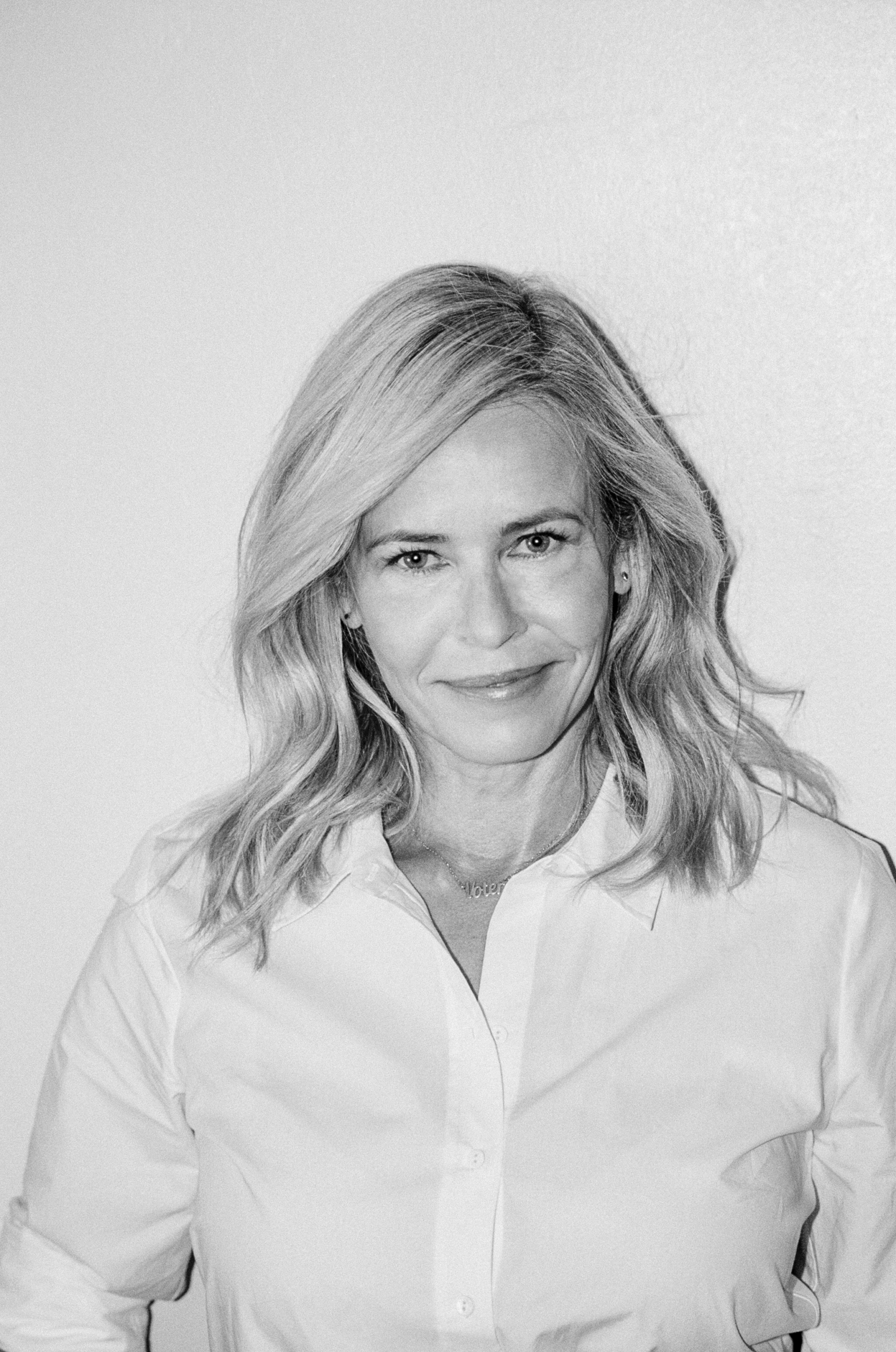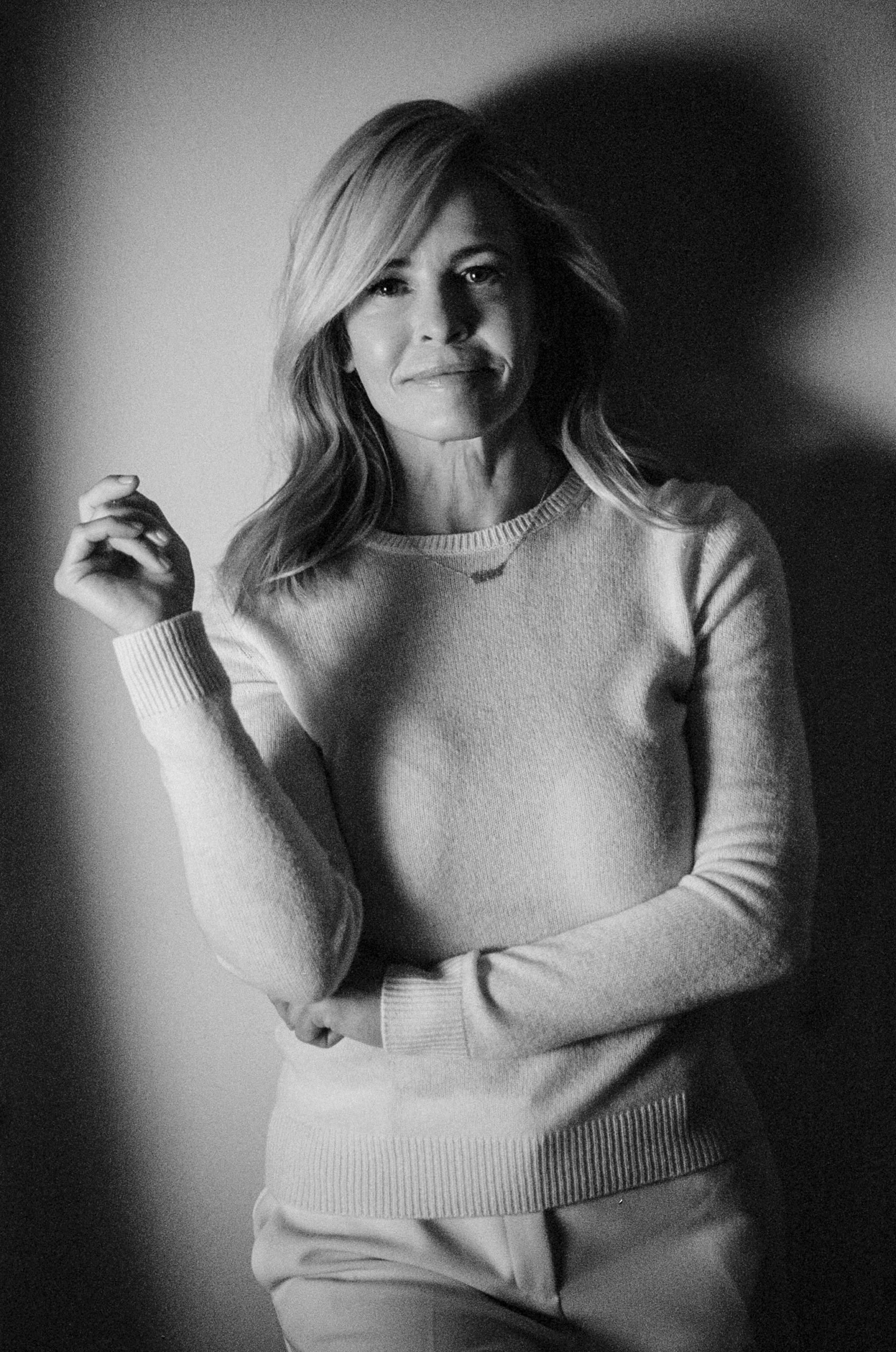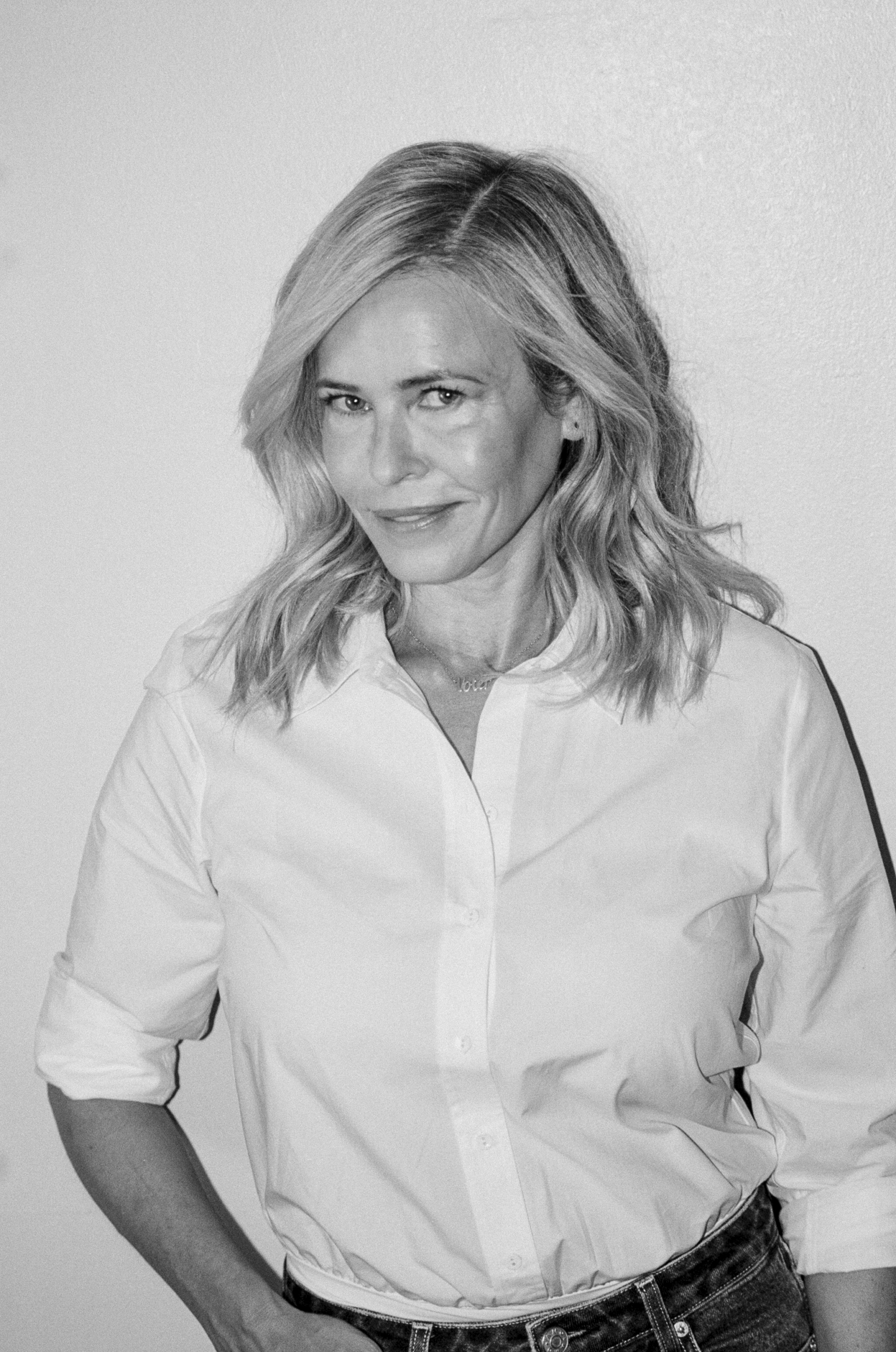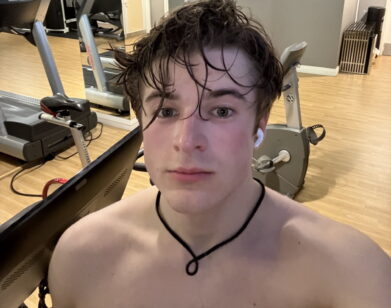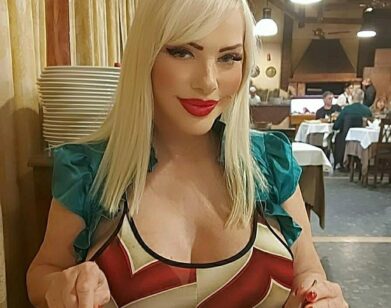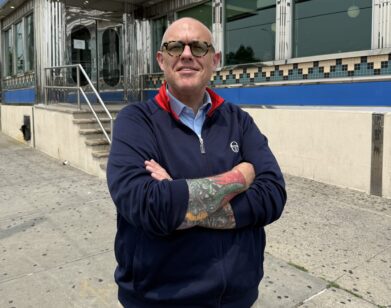therapy sesh
Chelsea Handler and Martha Stewart on the Hilarious Journey of Becoming a Better Person
Chelsea Handler is not a well-behaved woman. In fact, ever since she first stepped on the neck of the late-night comedy scene, she’s made it her brand: a blonde bombshell with spit-fire opinions and a readiness to be loud, in your face, and unabashedly political. Many will remember her as the host of Chelsea Lately on E!, which wrapped in 2014, or maybe from reading one of her many best-selling books. But after six years off the stage, the 45-year-old comedian is returning to her roots for her HBO Max special, aptly titled Evolution. Handler’s grand return to stand-up is an hour-long therapy session, touching on everything from her ex-boyfriend 50 Cent and her history with toad venom to the untimely death of her brother.
Though she may seem like an open book—her Instagram feed is rambunctious, anti-Trump, and often stoned—Handler is showing audiences her growth, after spending a lifetime learning what it means to truly evolve. As she tells Martha Stewart, another woman who lives and plays by her own rule book (and Snoop Dogg’s), the road to becoming a better person is a hilarious pain in the ass. —ERNESTO MACIAS
MARTHA STEWART: It’s Martha Stewart calling. Now, I want to know, do you usually get up this early?
CHELSEA HANDLER: Martha, I think you’d be surprised about a lot of my habits. In fact, I do get up around six o’clock, every morning.
STEWART: Even after a late night out?
HANDLER: It doesn’t matter what happens the night before, I wake up at six o’clock. Wherever I am in the world, every morning.
STEWART: That’s fantastic. Your habits are quite a lot like mine. I’m always up so early.
HANDLER: Well, that’s what I keep trying to tell you, that we’re basically twins.
STEWART: I think we are, several decades apart. What do you do at six o’clock in the morning?
HANDLER: First, I read the news on my phone. I try not to turn the television on, but sometimes I can’t help myself. Then I do my morning stretches because I recently threw my back out. I have to do all these physical therapy exercises. Then, my trainer comes over around 8:00, and then I work out with him. That’s how I start my day, usually, every day.
STEWART: That’s good. How long is your workout?
HANDLER: As long as I can tolerate my trainer. He’s pretty annoying, so sometimes I can only last for 45 minutes, but usually, it’s an hour.
STEWART: So even during COVID, you kept up with your exercise regimen?
HANDLER: For the first two weeks of COVID, I treated it like it was Spring Break. I went off. I ate what I wanted. I took as many edibles as I wanted. I had martinis in the middle of the afternoon. Then after two weeks of that, I thought, “This is what everyone is doing. I’m going to go in the opposite direction.” That’s when I started to get really serious about fitness. We made an agreement to not see other people, and we would train together each day.
STEWART: I had to give up my personal trainer because of COVID. He wasn’t getting tested enough, and so I tried to do it myself. I became a little lax. I do have horses, so I ride and I try to do a lot of garden work.
HANDLER: You could always train with my trainer and me virtually, if you want, Martha.
STEWART: That would be fun. Do you think you look better than you did before COVID?
HANDLER: I’ve definitely been getting more sleep than I’ve gotten in the last five years. I think that’s what’s rejuvenating me. With physical fitness, I have to say, it’s so important to be physically fit because it helps you be mentally fit, too. That’s something I didn’t appreciate when I was younger. I always thought working out was such a pain in the ass.
STEWART: You are younger, Chelsea. You’re only, what, 45-years-old?
HANDLER: I’m 45, Martha.
STEWART: I’m at 79, which is horrible. I don’t think about age at all. Most of my friends are much younger than I am, at least 15 to 20 years. All my older friends are so old now, the ones that are my age. They can’t hike anymore, they can’t ride bikes. They just don’t do what I do. They don’t go horseback riding anymore. So, I now am looking to my younger friends.
HANDLER: I think that’s the right move.
STEWART: Even playing cards—I’m finding that it’s better to play cards with younger people. You stay much, much more agile. And you win more.
HANDLER: It’s like playing tennis. You always want to play with somebody a little bit better, right?
STEWART: Always, always test yourself. That’s what I want to do. This performance stuff that you do, is that a personal test of your ability as a comedian? What is it that makes you guys stand-up comics? When did you know you could do it?
HANDLER: With stand-up comedy, you’re always wondering if you can do it, even when you are doing it. It lends itself to a lot of self-consciousness and a lot of insecurity. When I was starting, I was attracted to being on a stage with a microphone and no one else on the stage with me. There’s freedom right there. As I got older, I loved performing, but I burnt myself out. I was doing my talk show, I was on tour every weekend, and I was writing a book every year. I would combine all those three things, all year long, and eventually, I just burnt out. I didn’t feel like I had anything to contribute, stand-up wise.
I haven’t done stand-up in six years, and I kind of fell back into it on my most recent book tour last year. I realized that I was able to tell a narrative from beginning to end about my foray into therapy, what happened, and what I discovered. My anger towards the Trump administration—unpacking that with a therapist, and finding out why I was really holding onto so much anger. Therapy’s funny when you have a sense of humor. Stand-up has now taken on so many different forms that you’re able to go at it from a different angle.
STEWART: I think people want to hear why you weren’t there for six years. They want to hear what you went through in the last six years, but also in the last six months. They want to know how you’re coping. How did you find a therapist that would be able to, first of all, put up with you? And give you good advice. It must be a very hard job, for a therapist, to take on somebody like you.
HANDLER: I think it was. But everybody that is good at their job likes a challenge, right? I think, as a therapist, he had seen my shtick before. He had seen that I was holding onto something that I wasn’t comfortable talking about, and that I wasn’t comfortable being vulnerable. I have a real problem, being vulnerable in front of men.
STEWART: So why did you choose a man?
HANDLER: Well, because that’s my issue. Men. I wanted to get straight to the bottom of it. I don’t have that issue with women. I didn’t trust men. I like to be fiercely independent. I never really thought about where that was coming from. Why was I so steadfastly holding onto these things? What is my issue with being vulnerable with men? Dan, my psychiatrist, was really able to break it down, about what happened with my brother when I was young. Then, with my father. Being rejected, at a very young age, which causes you to distrust men for the rest of your life.
STEWART: So, you had troubles with your dad?
HANDLER: Before my brother died, he had told me, “I’m never leaving. I’m coming right back.” He was going on a hiking trip. Then he passed away. The whole family fell apart because everybody retreated into their little corners of grief. Nobody was really able to help each other in the aftermath of losing my brother. In a sense, I lost my brother and my father. I had a real chip on my shoulder about trusting men.
STEWART: Boy, it went back far.
HANDLER: Seriously. It’s such a pain in the ass to go to therapy and have to revisit this shit from when you were a little child. But the great thing about therapy is that it is so funny and so relatable when you’re trying to become a better person. I’d sit there and meditate with my therapist for 20 minutes, and then go downstairs and get in a fight with a parking lot attendant.
STEWART: You had a lot of concealed anger at your family. What about your mom? Is she an ally, or is she also a problem?
HANDLER: My mom was an ally. She’s no longer with us, but she was an ally, for sure. She wasn’t the leader in the family. My mom was just soft, simple, and quiet.
STEWART: So where’s your dad now?
HANDLER: He’s dead also. I have no parents, Martha. That’s why I want to be so close to you. I’m an orphan.
STEWART: But you still have another brother?
HANDLER: I have five brothers and sisters left. We have a family left, so our family’s in good stead now.
STEWART: Did they come to your special?
HANDLER: No. It was very COVID-safe. Everyone who had to come to the special had to be tested in advance, so family members will have to download HBO Max.
STEWART: How was it performing? It must be so weird.
HANDLER: At first I had to do my warm-up shows because I hadn’t done stand-up in a while. I had to do 20 warm-up shows at this club in New Jersey, and at this club in Providence, Rhode Island. They were at 30 percent capacity. We wanted everyone to feel safe when they were there, obviously. We had about 150 people there, and I wasn’t worried about the number of people. I thought, “You know what? This show is so personal to me. I’m so ready to do it at this time.” I wasn’t worried about not having a normal-sized audience.
STEWART: Their positive reaction must have made you feel so amazingly good. After six years, you must have been terrified of going in, but so relieved coming out.
HANDLER: You are terrified because if you go back to any medium that you’ve left, you’re like, “Is my audience still there?” You’re wondering if people are still going to come out and show up for you in the way they had shown up for you before. It was heartwarming, in a sense, and it was a lot of confidence-building. I didn’t know if I still had a spot.
STEWART: It took a lot of guts. I watch everything on an iPad. You read your newspapers on your phone?
HANDLER: I’ve got to stop doing that. I just had to get my first pair of reading glasses, Martha. I went into CVS and I bought a pair of reading glasses, and I never felt more defeated.
STEWART: I’ll send you some new ones. I just came out with a line of reading glasses, and they are different prescriptions, and they are so good looking.
HANDLER: Please do.
STEWART: You acknowledge that in addition to going to therapy, you also are using cannabis. Does the therapist recommend cannabis? Or were you already using cannabis?
HANDLER: Once cannabis became legalized in the State of California, what had been missing all these years was an educated component. So then, all of a sudden, we’re looking at labels and packaging and micro-dosing. When you’re dealing with that, you can control cannabis. I don’t have to have cannabis control me. Years ago, when somebody handed you a pot cookie, you didn’t know what was going to happen in the next couple of hours. I wanted help sleeping, and with the use of cannabis, my alcohol use diminished. So that was my first inkling. I didn’t have the desire to drink as much when I was on cannabis.
STEWART: You’re not drinking?
HANDLER: No, I drink. But not like I used to. I prefer cannabis as, sort of like a mood softener, something to kind of sand down the edges. It makes everybody a little bit less annoying, I would say. My assessment of cannabis is, when normally you would find a situation or a person annoying, if you add like 2.5 milligrams to that, you’re going to be okay with that person and that situation.
STEWART: Well, that’s another thing that you and I seem to have in common. Finding people around us annoying. Why is that, do you think?
HANDLER: I have a lot of impatience. I find when people whisper to be annoying. I find when people take too long for transactions to happen, like when you go to the airport and you walk into a Hudson Bookseller— the slowness of the transaction, of purchasing a book, I find incredibly annoying.
STEWART: The one thing that really annoys me is when I order on the telephone, like room service in a hotel. They want to repeat what you ordered? I just say, “Don’t do that, please. Just send what I ordered.” Then, invariably, something is missing.
HANDLER: That is in my stand-up special, Martha. I say that exact thing, as one of the lists of things that annoys me.
STEWART: Oh, god. We are related. This is horrifying. So when you do these trials with, say 30 or 60 people in the audience—do you then watch a film of it?
HANDLER: For this, what we did was, we would take notes after every set and go over what I missed. But this special was unique, in a sense, because there is a turn in the special. There is a moment where I get very, very deep, about the loss of my brother. There are about three or four minutes within the special that are very serious. It was very hard for me to allow that time, to allow the moment to be what it was, instead of trying to fast-forward through it or fill it up with jokes.
STEWART: People like to hear that, too. Because everybody’s had some grave disappointment in their life. They like to hear that somebody as successful as you has also suffered. That gives you more credibility.
HANDLER: That’s the thing that people, I think, know that they’re going to get from me. I’m not full of shit. I’m only going to give you the truth about what my experience is right now. And if I’m drinking a lot, I’m going to talk about that. If I’m smoking cannabis, or eating cannabis, I am going to talk about that.
STEWART: Now, politics plays a big part in your special. Why do you do it?
HANDLER: First of all, being political right now is a real responsibility. Especially coming from the position that I’m in, which is a position of great privilege. Yes, I work hard and I have worked hard, but a lot of the beneficiary things I’ve received in my life, I have because I grew up in a country where the color of your skin is more valued if you’re white. So I firmly believe that it is imperative for someone like me to stand up and say, “This is wrong.”
STEWART: Was there any reaction in your audiences to this part of your stand-up?
HANDLER: There are a lot of women that come to my shows that bring their husbands or boyfriends, who are definitely Trump supporters. Even though it’s not the crux of my show, it’s the beginning of it. To me, it’s very black and white. There’s no gray area in supporting Donald Trump at this point, so I have no shame in being very vociferous about that.
STEWART: Is it a coincidence that your special is coming out right before the election? Did you want to do that, or was it just happenstance?
HANDLER: I did want it to come out before the election. That’s kind of why I did it through COVID, and I was steadfast in getting it done. Actually, we have someone in common, because right after I filmed my special, I came up to Maine and Barbara Bush messaged me. We did Pilates a bunch of mornings together. She said she had just had dinner with you.
STEWART: We were at Hidden Pond, and I was filming a week-long Chopped show. Barbara lives right down the road. I didn’t get to see the presidential quarters there, on that peninsula. I wanted to go. Did you go out there?
HANDLER: I did. We went to play pickleball one day.
STEWART: I think her sister has done so well on the Today Show, and I think that Barbara really wants to do something equally effective. They’re nice girls. Did you have fun in Maine?
HANDLER: I got a personal tour of George Bush’s art collection, from him when we went to Kennebunkport. So that was unexpected. I tried to behave myself, so I didn’t get into an altercation with him. That was challenging.
STEWART: What does his art look like? Is it good?
HANDLER: I’m a Philistine when it comes to art. So I don’t really have a good eye to critique any art, but I think my reaction was, “Wow, the paint is very thick.” I was very stoned when I got the tour of his artwork, so I had to keep my sunglasses on.
STEWART: Well, Chelsea, have a lovely, lovely rest of your day and go smoke a weed. Go smoke whatever you smoke.
HANDLER: Go smoke a weed.
———
Makeup: Jamie Greenberg at The Wall Group
Hair: Kylee Heath at A-Frame Agency
Stylist Assistant: Katya Giles Netter

